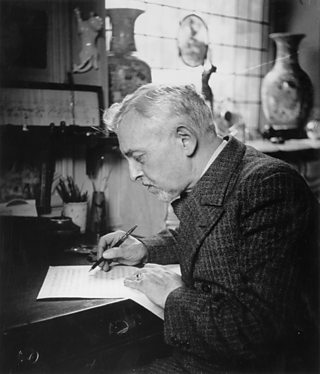Meet the greatest French composer you’ve never heard of
‘Rhapsodic, brooding and startlingly beautiful, his language is deeply personal – passionate yet extraordinarily detailed, sophisticated and elusive.’

That’s how US conductor JoAnn Falletta describes the man she characterises as one of ‘the most important French composers.’ But who is she talking about – Debussy? Ravel? Fauré?
The man Falletta credits with such a prominent role in French classical music is: Florent Schmitt.
Who was Florent Schmitt?
Schmitt was born in 1870 – eight years after Debussy and five before Ravel. He moved in the same world as these two French musical giants and was also taught by two more – Massenet and Fauré – at the Paris Conservatoire.
In 1900 he was awarded the Prix de Rome, a prestigious composition prize (which had previously been won by Bizet, Massenet and Berlioz… though it has to be said few of the winners of this prize are household names today – Gaston Serpette, anyone?).
Over the next few years Schmitt travelled through Europe, North Africa and parts of Asia. The result, musically speaking, is a composer completely seduced by the exotic promise of the East
Discovering the Orient
It was during this period that Schmitt wrote what has become his most famous work, La tragédie de Salome (1907) as well as two suites of incidental music written in 1920, inspired by Shakespeare’s Antony and Cleopatra – which you can hear at the Barbican on 4 October. The subject suited his interests perfectly.
The author André Gide had created a new adaptation of Shakespeare’s play and the production would star one of the biggest names of the time, Ida Rubinstein – an actress and dancer who went on to commission Ravel’s Boléro – as Cleopatra. The new adaptation included dancing, so naturally Gide needed music. Schmitt was the man he chose to conjure the sensual world of ancient Alexandria through music.
The production was an epic – it stretched on late into the night and into the next morning but Gide loved the music, saying: “All that I had hoped for and waited for, I found in those pages.”
What does his music sound like?
Schmitt created two three-movement orchestral suites from the incidental music and you can hear the influence of Ravel and Debussy in the beautiful harmonies, and of composers like Rimsky-Korsakov in the orchestration.
But running through the two suites is the influence of Wagner. Parts of the suite are so Wagnerian they could be deleted scenes from the Ring – in which Brünnhilde and Siegfried take time out to visit the souqs of Alexandria.

But that doesn’t do Schmitt justice.
In a 2011 interview with BBC Music Magazine the French conductor Yan Pascal Tortelier said: “I think it is difficult to fit Schmitt into the line of development of French music because his style and language, in terms of atmosphere and expression, is the opposite of Debussy.”
Schmitt’s music was recognised as important, unique and exciting when it was first written and it is gradually being rediscovered, performed and recorded (often for the very first time) now, almost 60 years after his death. So isn’t it a bit sad to describe his compositions as ‘a little Wagnerian’ or, ‘in parts, Debussy-esque’?
His music does show signs of the influence of other composers, but it is also unique.
What can you expect, then, if you’re heading to the Barbican on 4th October to hear his Antony and Cleopatra Suites?
A lush, sensual work that revels in exotic harmonies, unusual rhythms and rich orchestral textures. In other words, something utterly Schmittian.

The BBC Symphony Orchestra is collaborating with Shakespeare's Globe for a performance devised by Globe Music Director Bill Barclay and director Iqbal Khan. Featuring actors from the Globe, the performance is a rare opportunity to see and hear Schmitt's Antony and Cleopatra in its dramatic context.
-
![]()
Tuesday 4 October, 7.30pm
The BBC Symphony Orchestra joins forces with Shakespeare's Globe, interspersing music with drama in Florent Schmitt's sensual and expressive setting of Shakespeare's play at the Barbican. Click here to book tickets.

